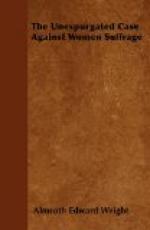PREFACE
It has come to be believed that everything that has a bearing upon the concession of the suffrage to woman has already been brought forward.
In reality, however, the influence of women has caused man to leave unsaid many things which he ought to have said.
Especially in two respects has woman restricted the discussion.
She has placed her taboo upon all generalisations about women, taking exception to these on the threefold ground that there would be no generalisations which would hold true of all women; that generalisations when reached possess no practical utility; and that the element of sex does not leave upon women any general imprint such as could properly be brought up in connexion with the question of admitting them to the electorate.
Woman has further stifled discussion by placing her taboo upon anything seriously unflattering being said about her in public.
I would suggest, and would propose here myself to act upon the suggestion, that, in connexion with the discussion of woman’s suffrage, these restrictions should be laid aside.
In connexion with the setting aside of the restriction upon generalising, I may perhaps profitably point out that all generalisations, and not only generalisations which relate to women, are ex hypothesi [by hypothesis] subject to individual exceptions. (It is to generalisations that the proverb that “the exception proves the rule” really applies.) I may further point out that practically every decision which we take in ordinary life, and all legislative action without exception, is based upon generalisations; and again, that the question of the suffrage, and with it the larger question as to the proper sphere of woman, finally turns upon the question as to what imprint woman’s sexual system leaves upon her physical frame, character, and intellect: in more technical terms, it turns upon the question as to what are the secondary sexual character[istic]s of woman.
Now only by a felicitous exercise of the faculty of successful generalisation can we arrive at a knowledge of these.
With respect to the restriction that nothing which might offend woman’s amour propre [self love] shall be said in public, it may be pointed out that, while it was perfectly proper and equitable that no evil (and, as Pericles proposed, also no good) should be said of woman in public so long as she confined herself to the domestic sphere, the action of that section of women who have sought to effect an entrance into public life, has now brought down upon woman, as one of the penalties, the abrogation of that convention.
A consideration which perhaps ranks only next in importance to that with which we have been dealing, is that of the logical sanction of the propositions which are enunciated in the course of such controversial discussions as that in which we are here involved.




